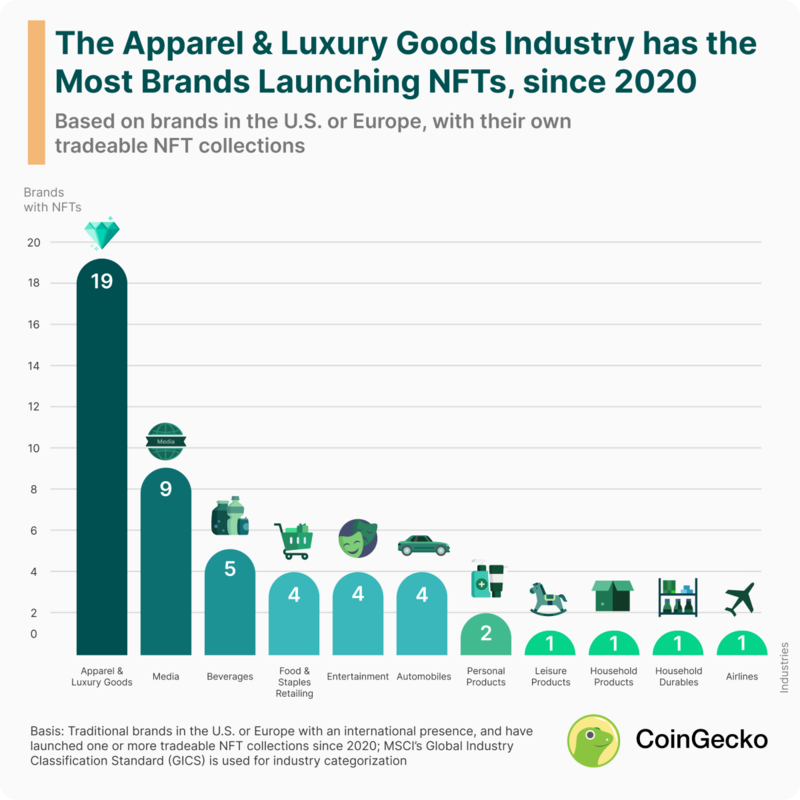Apparel, luxury brands lead the list of those embracing NFTs
Apparel and luxury brands are among the companies showing the greatest interest in using web3 (and connecting with consumers in the space) using non-fungible tokens (“NFTs”). Based on recently compiled data on “traditional” brands – i.e. those whose core business falls outside the web3 space – that have launched tradable NFT collections since 2020 (either independently or with a partner), crypto market analysis website CoinGecko found that out of 51 brands on the list are 19 brands (37 percent) from the clothing and luxury goods industries, followed by media companies, those in the beverage industry, “food and staple stores,” entertainment companies, and car manufacturers such as Mercedes, McLaren, and Audi.
Looking specifically at the “Apparel and Luxury Goods” brands, CoinGecko puts adidas at the top of the brand ranking by trade volume, with Adidas Originals in the Metaverse NFT Collection – a four-way collaboration with Bored Ape Yacht Club, Punks Comic , and Gmoney – with a total volume of 47,000 ETH since its launch in December 2021. According to CoinGecko’s data, the German sportswear giant is followed by Nike (apparently excluded by pre-acquisition RTFKT volume), Dolce & Gabbana and Gucci. Still, CoinGecko states that Puma’s Nitro Token and Nitropass, and Tiffany & Co’s NFTiff collection are among some of the latest launches by brands in the apparel and luxury goods industry.
As for other apparel/luxury names on the list, CoinGecko includes Louis Vuitton, which launched NFTs as part of Louis: The game video games; LVMH-owned Givenchy, which teamed up with artist Chito to create a series of 15 NFTs in November 2021, and Hublot, which collaborated with artist Takashi Murakami; Coach, which launched its first NFTs in December 2021; Prada, which boasts an NFT-bound Time Capsule Collection; Lacoste; and Macy’s, which this summer announced it would auction off 10 limited-edition NFTs as part of its 95th Thanksgiving Day Parade.
Reflecting on the findings, CoinGecko co-founder and COO Bobby Ong says that “despite the current bear market conditions, many of these ‘traditional’ companies are leveraging NFTs in their branding and marketing efforts as a way to engage their audiences and communities .” It will be “interesting,” he notes, “to see how this trend holds up next year — and whether brands in industries outside of this list unlock NFTs in their marketing strategies.”

CoinGecko’s findings follow from data gathered at Dune Analytics, which revealed that Nike, Dolce & Gabbana and Tiffany & Co. are among the most notable companies generating revenue from NFTs. According to the Dune Analytics data, which highlights the primary sales revenue, secondary transactions and royalties associated with some of the early brands participating in the NFT space, as of August, Nike had generated a total of $185.31 million in revenue from the NFT collections, namely those from RTFKT, the digitally native brand that it acquired in December 2021.
Second on the overall list was Dolce & Gabbana, which made headlines – and set records – in October 2021 for the launch of Collezione Genesi, a nine-part collection of fashion NFTs and physical garments that sold the equivalent of nearly $5.7 million . The Italian fashion brand has since expanded its NFT offerings, allowing it to generate $25.65 million in total NFT-related revenue, of which $23.14 million comes in the form of primary sales revenue and $2.52 million in royalties (on 9.11,000 transactions).
And not to be overlooked, Tiffany & Co. ended up. at No. 3, with $12.62 million in primary sales revenue. This number is the result of the 250 NFTs that the LVMH-owned jewelry company offered and sold to CryptoPunk’s NFT holders this month for 30 ETH each. According to the Dune data, Tiffany & Co. does not generate royalties for secondary sales; the secondary volume for Tiffany & Co. However, NFTs are worth $3.4 million based on 74 secondary transactions.


